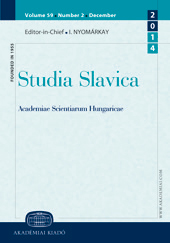Konceptualizacja pojęcia <ciało> we frazeologizmach języka polskiego i węgierskiego
oraz w środkach masowego przekazu
Conceptualisation of the <body> concept in the phraseologies of Polish and Hungarian and in mass media
Author(s): Janusz Bańczerowski , Dorota Dziewońska-KissSubject(s): Theoretical Linguistics, Comparative Linguistics, Finno-Ugrian studies, Western Slavic Languages
Published by: Akadémiai Kiadó
Keywords: the linguistic image of the world; human body; phraseology; Hungarian; Polish; comparison; metaphoric expressions; conceptualization;
Summary/Abstract: The main aim of this article is to compare the Polish and Hungarian phraseological and mass media expressions concerning the name of human body. The analysis of the material showed the certain similarities but in a lot of cases evident differences as well. The majority of metaphors found in set phrases suggests anthropocentrism and shows that people not merely acquire knowledge of and experience the world but also assess it in their own particular ways. The reconstruction of the linguistic image of the world as a language- and culture specific phenomenon makes it possible to gain a possibly adequate idea of the categorization of the world by humans and the conceptualization of information thus attained. The conceptualization of the notion of human body includes for example: a body as a MAN; as an ENEMY; as a FLAT; as a CONTAINER, as an OBJECT; as an OBSTACLE; as a PATTERN /MODEL; as a GOODS; as an OBJECT OF ATTACK; as a MEANS OF PAYMENT, etc.
Journal: Studia Slavica Academiae Scientiarum Hungaricae
- Issue Year: 59/2014
- Issue No: 1
- Page Range: 73-79
- Page Count: 7
- Language: Polish
- Content File-PDF

